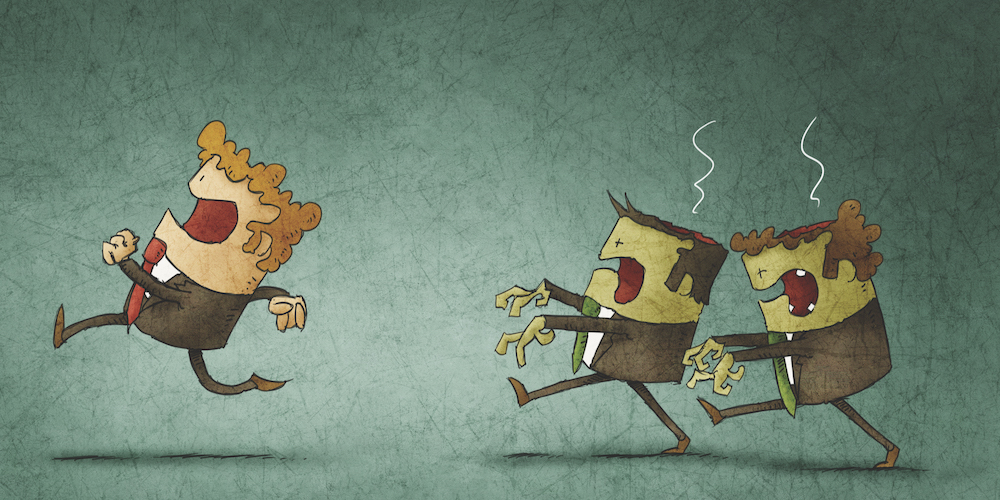There is little that is less productive for a team member to engage in than drama, and to subsequently become a “drama-baby” in the process. In fact, there is little that equals drama’s ability to distract from priorities, waste time, drain energy, and make alps out of anthills.
Drama is the result of immature acts, committed by small-minded and selfish people who are either indifferent or oblivious to the negative value they inflict on both culture and teammates. While many of us may be prone to fall into the drama trap occasionally by overreacting to a simple event or conjuring up exaggerated and gloomy scenarios unlikely to ever occur–and normally doing so based on limited information—the drama-babies I’m addressing in this piece are those who are known for it. When you see him or her walking down the hall you can almost smell drama and a headache. Some drama-babies have perpetrated drama for so long they don’t even realize they’ve become a cultural contagion of toxic behavior.
The following points are designed to create self-awareness and strategies to help stop drama in your workplace and to curtail the development of drama-babies. While you won’t ever eliminate drama completely from entities populated by human beings, you can do more to model productive behaviors personally, and to leverage peer awareness and peer pressure to demonize and minimize drama throughout your dealership.
Three Quick Thoughts on Drama and Drama-babies
- To create the context for this piece, consider that Urban Dictionary defines drama as: “A way of relating to the world in which a person consistently reacts to or greatly exaggerates the importance of benign events.” Drama-babies have a predictable knack for overreacting to everyday events, for choosing to be offended, and for making everything possible be all about them.
- Typically, drama-babies are those who are chronically bored, or who have an inordinate craving for attention. They covet sympathy and continually bait others into rescuing them in some manner: normally through inordinate attention, sympathy, counseling, or helping. The bottom line: drama-babies don’t really have much of a life, so they endeavor to create a false reality that feeds their fancies and dramatic appetites.
- Drama-babies enjoy manipulating others, oftentimes dragging them into their hyperbolic fantasyland to gain attention, or make their own dullard existence more interesting.
Five Evidences of Drama
Following are five evidences of drama in general, and of drama-babies specifically, followed by five suggested remedies. Be aware of these symptoms; watch for them; address them when they manifest; and encourage peer accountability to discourage dramatic behavior from top to bottom in your dealership.
- Having one supposedly serious crisis after another.
Example: Over time, drama-babies communicate an unlikely and immense trail of crises in their lives that may include exaggerated family, health, or relationship issues.
- Constantly telling other people about one’s personal or career problems.
Example: You normally know far too much information about drama-babies; every headache, heartache, or hemorrhoid is described in agonizing detail.
- Claiming to have experienced negative experiences that are highly implausible.
Example: They’ve been personally affronted, offended, insulted, dismissed, disrespected, or slandered by an array of haters and bullies they encounter in their everyday lives: in traffic; at the Wendy’s drive-thru; from law enforcement and flight attendants; in attacks by social media trolls or Russian hackers; and even the occasional stalking or kidnapping by little green men in UFOs.
- Making claims without sufficient facts, or lack of detail about supposedly serious events.
Example: Starting or hearing rumors and blowing them out of proportion; or, presenting with authority what they have minimal—if any—facts to base their claims on.
- A pattern of irrational behavior and reactions to everyday events.
Example: Someone took Sue’s Diet Dr. Pepper from the break room fridge and she’s convinced a teammate is set on destroying her. Or, John didn’t get the credit he thought he deserved for the project’s success so now he’s updating his resume because he “knows” he’s about to be fired.
Five Remedies for Drama
- Start with your own example.
Go to work to work smart and focus on the aspects of your job you can control. Speak more in terms of what is positive, possible, and productive. Stop being consumed with what someone else is doing or getting and mind your own business. Don’t gossip and reject gossipers. Look for ways to add value, bring solutions to the table and positively impact team members and customers alike.
- Get your mindset right and keep it healthy during the day.
My book, Unstoppable, goes into extensive detail on how to develop this essential discipline. In a nutshell: limit your intake of garbage media, websites, and conversations, and replace it with a structured routine that inspires, motivates, and educates. And start it before you get to work in the morning. Get in the zone before you leave your house for the dealership.
- Keep yourself and others so busy with high expectations and the productive activities necessary to achieve them that there is no time for drama.
Remember that human beings, including yourself, develop to their potential within the confines of a structured and effective daily routine—one that leaves no time to initiate or listen to drama-baby nonsense.
- Conversationally, firmly, and respectfully address drama and refocus the perpetrator on something more productive and encourage team members to do likewise. This type of peer accountability is essential to driving out drama. Set the example with words like:
“This is starting to sound like drama, I’m getting back to something more productive.”
“This is starting to sound like drama, let’s both get back to something more productive.”
“You can’t control it or affect it, so get back to something you can control and affect.”
“Let’s get back in the zone.”
“Let’s leave the drama zone and do something productive.”
“Let’s make today about performance, not excuses.”
- Stop pandering to dramatic people with constant hugging, coddling, pep talks and rescuing.
You teach people how to treat you, so if you respond to drama unproductively, you’ll encourage more of it. What you reinforce with positive attention, including drama, you can expect to see more of. And if YOU are a leader who engages in drama personally, you are giving those in your charge license to do likewise. Inevitably, if it hasn’t happened already, you will become the unofficial momma or papa of a whiney and miserable family of drama-babies in your department.
As a leader, you’ve got to do better, and you’ve got to start now.








